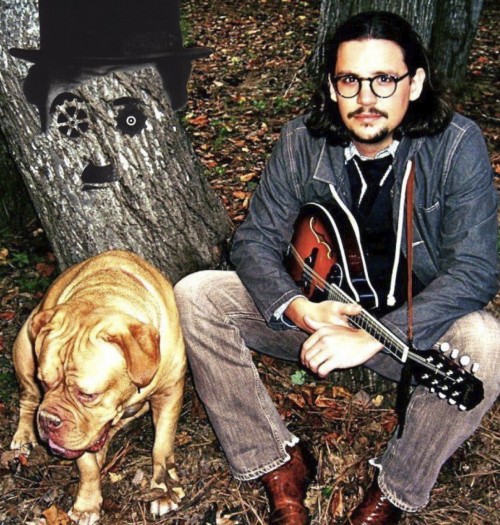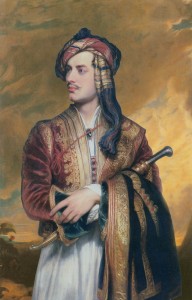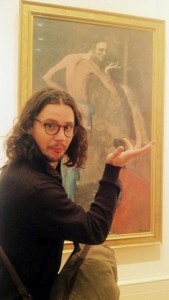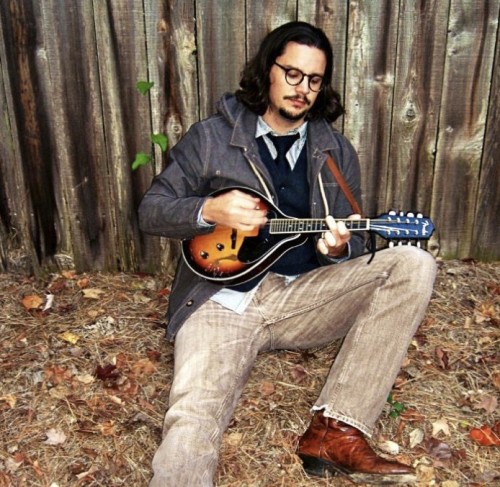Meet Charles Ozburn: His Work, Thoughts on Childe Harold, Etc
***
After I read at Mellow Pages in the Fall I was greeted by a man with a deep voice. I was in a bit of a fog-tunnel, as I usually am after readings, and it took me a while to figure out that this man (Charlie – Charles Ozburn) was speaking about Tiresias: variously male and female, etc. One of the great things, of course, about reading in different places is that you meet new and sometimes great people. Charlie is an example of the latter. And, soon, I found out that Charlie has a real and sustained “thing” for the club-footed Lord Byron’s work. And, in particular, Childe Harold. So, into the late hours that night I Brooklyn hung out with Charlie and other Mellow Pages folk. And then kept in touch with Charlie.
***
And, so, anyways, to follow is Charlie’s take on why Byron and Childe Harold are still highly relevant as well as a couple of samples of Charlie’s novel, A Well-Spun Spoon (of a Lark, a Lily & a Loon), where he attempts to “reflect the contradicting faces of Childe Harold against one another to, in Venus Effect, split the Byronic Hero into two (a he and, of course, a she)”
***
RK: I’ve seen the words “Childe Harold” in print a few times, I guess, but I don’t believe I’d ever heard them in conversation before I met you. And I know Byron’s work, especially “Childe Harold,” is important to you. But can you tell us please why it’s worth reading?? (what could a reader get out of it that he/she can’t get anywhere else)
CO: There exist some very basic assumptions of the human condition called human emotion, which–as expressed within an artistic medium, a plot line or even day-to-day interaction–may seem simplistic today. However, without Childe, such assumptions do not exist. For from Byron’s ink was born the founding strokes of the Modern Man, but nonetheless it is ink so far ingrained within our beings that it is often taken for granted today if noticed at all. Childe’s mark, like the faded mirror you see, is as ubiquitous as is felt; as important as is faded as is masked as is shrouded dark; more heard in the echoes of our subconscious than is shouted aloud; certainly more misunderstood as a literary key word taught to the too young an age to be realized any substantive credit due. For everyone knows of Lord Byron and, of course, every Dick or Jane, who ever paid a bit of attention in high school English has heard, if only in passing, the term ‘Byronic hero’ – but, given you are not the first person–much less poet–who has with earnestness admitted to an honest ignorance of Byron’s legacy, I suppose it is safe to say today that the roots, flowers, fruits and weeds born of Byron and his work have grown so tall, so far, so wide, so plump, so beautifully wretched, so wretchedly right, so obviously plain that the shadowing stature of their booming bloom have all but sheathed the very soil and seed from which beneath same sprouted.
Childe Harold is the lightly veiled pen-to-page fictive form of young Lord Byron written contemporaneously in reflection along his own path from disillusioned playboy gamboling in retreat of war about the exotic pleasures fields of faraway fanciful worlds to finding therein the world out there lay so much more than perceiving one’s own superiority and self-serving one’s self righteousness of pity in vain; because so many of us today with our world and war weary eyes and smug cachets find ourselves in his same embarkation shoes, entrapped in a claustrophobic cynicism our own and gamboling about lost in this newly found unfamiliar land where all are free to know all; because not only did Lord Byron embody all things Rock Star, but because he so clearly invented the role; because he was Andy Warhol 100 years before Campbell canned its first soup; because he was Lou Reed and Patti, Janice and Jerry, and Richard. Levon and Rick 200 years before Chelsea changed the game or Monterrey poised itself to pop! because he was the most famous person (not named Napoleon, Pope Pius VII or King George IV) in the world whose fame stemmed not only in the shore-to-sinking-shore gossip and lore of his lustfully crude affairs and insatiable appetite for the every and all indulgence of the night, but also from within the complexities and eloquence of his pen and form conformed in part to impart a never before felt freedom to the forlorn and staid by feathering together such colors of the world never before him presented; because he dove to depths unseen and exposed the flickers of light existing in the darkest, most savage chasms of our being; because he charged hard a romaunt and lived a life only played out before within the fancifully penned heroes of lesser poets concocted to pretend they knew the ways and means of the rat and the king and of
the queen and jester the molester and of the snake and of the fawn and of the lady commonwealth and lady strumpet, of the night and of the dawn and of all things captured by the sun, and of those faraway stars defined and of those stars yet to align, and of those stars closer to home who will simply never be; because Lord Byron actually did; because the ideologies unearthed, perceived and along his pilgrimage would become those which would come to free all heroes–both fictional and real–to explore the fortitude only found within the softer mystique of femininity; because he stripped the sword from the hero’s hand and shewed him (perhaps as a her) as more than the cock-strong caricature of a conscripted warrior of yore, who never shed a tear, knew not how to love, and never really was; because even so, he would find his nonfiction end not by drowning in the tomfoolery tides of carpe diem, but rather in true-to-myth Odyssean tradition with sword in hand fighting (no shit) to free the statues and stature of Greece from Turkish occupation (perhaps, though, too from the passing phantoms descending their own ancient mold); because he showed that even the strongest, most heroic porcelain lions of lore–like the noble beast he would become–are as real and as weak as the rest when beheld within themselves, and that this undeniable truth ought not only be told, but ought be thought a virtue to laud, applaud, uphold and revere; because he is not named Keats; and because I say so!
***
excerpt (1) from Charlie’s novel:
Of the fiery hue flowing long past her shoulders, how she had once thought it a curse. Oh, how she had loathed her hair as she fought the inevitability to come of age in a microcosm of blondes and brunettes—for to be different from the rest is never a child’s ambition—though as she ripened into sensibility, she began to understand why she, above all others, had elicited the most attention from the Sycmorian lads. While in her eyes, one could pass through portals into starry skies, hypnotized in autumn as though falling for the sun, it was not they that bore the most captivating of her colors. Rather, it was from the contradistinctive complexity of her tresses that arose such allure. For she learned as an adult, that to be different is appealing — and to be appealing is good.
Her hair, while free of powders or dyes, was not always seen as the same autumnal red however. From beholder’s eyes, chromatic aberration ofttimes reflected selfsame distortion along the spectrum of white light, thus casting forth the fringed channels of divergent color. Many-an eye had set sail the channel and seen shades darker than mahogany, while others the reflecting sands of the Sahara.
The tide lines of her iridescent tangles swelled and fell in braid and humble array that day as unmarred as ever before — and on that day that which had tainted her so was to part ways with the past to in lovely form become a crown surely to be envied and praised. The eldest of Clem Baker’s gangly redheaded daughters had grown out of such awkwardness and into the princess bride illuming back at her in the mirror — although, standing in reflection, she felt no different from before.
Below the headpiece, a soft face of refinement–pale and imperturbable–stood inverse to her on her side. Had she not known the soft skin of the lovely bride bounded to the mirror to be her own, she could have just as well seen in reflection a young flower girl in flower dress readying herself to precede in pedals another’s long walk.
Blinking eyes with the more ripened of the two, the greener girl’s first inclination was to curtsey–if only for sake of propriety, for she would have surely mocked the painted peacock parodying the tom boy once turned away–but she caught herself just before doing so in recognizing for the first time the gravity of her not so long before flowering. Melodies in motion whistled in warble–loudly in circles as they often do–singing out she could not possibly be old enough to be readying herself in white to start a new life, but the rhythms of logic tapped a different tune telling her she was much too old to be the flower girl whom most of her wished she still was.
In truth, she in that moment was neither the Poulsard of maidenhood–poised and sanguine, standing stately within the glass–nor the Bastardo grape, tottering in time and caught scared in stare of her own tick tocking on the other side. Rather, her marrow was caught somewhere in the middle, entrapped in the reflective glass of Venus as the real and the ideal, the young girl, the young woman, and the woman. In her mind, she still but a child, but her womb told a different tale, a tale that told her it was time to part ways with her childish ways to make room for her own.
To all those outside awaiting her introduction, a most grand introduction it was to be, the young bride was something much different altogether: the starlet debutant of a generation, the sprouting embodiment of all things good that was to come of Sycamore. Of this, she was well aware and at times relished, though more often reviled.
For she had not asked for her crown.
***
***
excerpt (2) from Charlie’s novel:
Open my eyes: within a mind I sit, within another I exist, naked, a masked ospite, alone and cornered in Lucca’s quarters looking out onto to the Bridge of Sighs–same as Lucca before, a six sided mirror at my side–under which sift song-less rows of silent gondoliers looking onto to me at he or we and he at me and so on and so on, if only for a moment, a still moment, a framed moment, a moment perhaps of our moment, a moment in time for which I dare not ascribe a length of time when I stood frozen in stare for fear of something I know not what with striped clad men, boys, and them at me. Not a moment later a song, their song, maybe my song, maybe her song, maybe our song ripples out faintly to me as if the moment never existed, as if I never existed, as if she, Ada Mae never existed, as if time never mattered at all. And from convulsion arises song to my naked window. And from silence springs strings, Vivaldi’s strings to be presumed, hearkening to and fro and back from then long ago up to me now, or perhaps coincidentally up to no one at all. The melody sung spins out atop the strings once more, atop waters moving once more. They glide once more. They row once more in concert once more, though not with another once more, happenstantially if so, but to the rhythm of the canal once more: one which I know, have heard, yet have not with my eyes known in movement–same as you, I suppose–until now.
***
***
Charles Ozburn lives in Brooklyn, NY. In addition to writing he also, with his fiance, collaborates on music. Click here if interested.
Tags: charles ozburn, Childe Harold






[…] designed the Mellow Pages website and will be reading from a novel-in-progress called Heraclitus; Charles Ozburn, who writes like a king and may or may not read from his thousand-page work-in-progress A Well-Spun […]